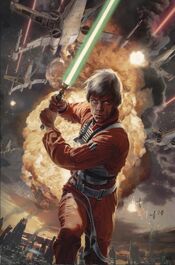
"Two fighters against a Star Destroyer!?"
Another Tuesday, another highlighted trope. Every week we venture into the black hole that is TV Tropes and investigate a theme or device that makes the entertainment we love work. Up on the docket is a favorite of mine: Deadpan Snarker.
A character given to gnomic, sarcastic, sometimes bitter, occasionally whimsical asides.
The Deadpan Snarker exists to deflate pomposity, point out the unlikelihood ofcertainplans, and deliver funny lines. Typically a Deadpan Snarker isthe most cynical supporting character. In most cases, it is implied that the snarker would make a good leader, strategist, or consultant given their ability to instantly see the flaws in a constructed plan. More often than not, their innate snarkiness is the only thing preventing the other characters from comprehending this for themselves. In other cases, the Deadpan Snarker resorts to sarcasm because they’re the Only Sane Man.
The Star Wars Expanded Universe has a number of these characters. Most notable is Mara Jade, the snarky foil that Luke Skywalker so desperately needed in his life. Of course, their son Ben takes after mom. One of my favorite lines from him in Fate of the Jedi occured after Luke had relayed some stories of personal failure.
Ben: You know, it gives me hope that you screwed up so badly and so consistently as a kid, Dad.
From the X-Wing novels, you’ve also got Ton Phanan and Hobbie Klivian. The latter of which played the role of Deadpan Snarker perfectly in Starfighters of Adumar. A non-Star Wars example I’ve enjoyed lately was the character Fran Kranz played in Cabin in the Woods. That’s a case of mixing genre savvy with deadpan snarker.





